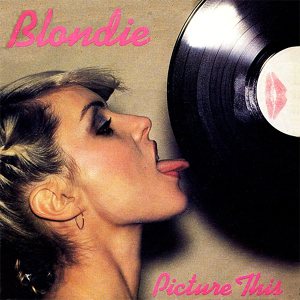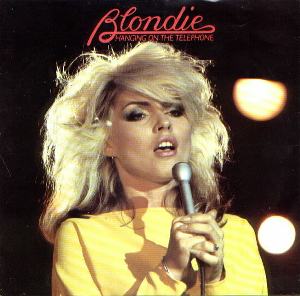
Blondie is an American rock band founded in 1974 in New York City by singer Debbie Harry and guitarist Chris Stein. The band was a pioneer in the American new wave scene of the mid-1970s in New York City.

"Call Me" is a song by the American new wave band Blondie and the theme to the 1980 film American Gigolo. Produced and composed by Italian musician Giorgio Moroder, with lyrics by Blondie singer Debbie Harry, the song appeared in the film and was released in the United States in early 1980 as a single. "Call Me" was No. 1 for six consecutive weeks on the Billboard Hot 100 chart, where it became the band's biggest single and second No. 1. It also hit No. 1 in the UK and Canada, where it became their fourth and second chart-topper, respectively. In the year-end chart of 1980, it was Billboard's No. 1 single and RPM magazine's No. 3 in Canada.

The Hunter is the sixth studio album by American rock band Blondie, released on May 24, 1982, by Chrysalis Records. It was Blondie's last album of new material until 1999's No Exit. It was recorded in December 1981.

"One Way or Another" is a song by American new wave band Blondie from their 1978 album Parallel Lines. Lyrically, the song was inspired by Blondie frontwoman Deborah Harry's experience with a stalker in the early 1970s, an incident which forced her to move away from New Jersey. The song's music was composed by bassist Nigel Harrison, who introduced the Ventures-influenced track to keyboardist Jimmy Destri.

"Heart of Glass" is a song by the American new wave band Blondie, written by singer Debbie Harry and guitarist Chris Stein. It was featured on the band's third studio album, Parallel Lines (1978), and was released as the album's third single in January 1979 and reached number one on the charts in several countries, including the United States and the United Kingdom.

"War Child" is a 1982 song by the American rock band Blondie, featured on their sixth studio album The Hunter. The song was released as a second single from the album in various countries, but not in the band's native US. There is no music video for this single.

"Atomic" is a song by American rock band Blondie from their fourth studio album, Eat to the Beat (1979). Written by Debbie Harry and Jimmy Destri and produced by Mike Chapman, the song was released in February 1980 as the album's third single.

"Rapture" is a song by American rock band Blondie from their fifth studio album Autoamerican (1980). Written by band members Debbie Harry and Chris Stein, and produced by Mike Chapman, the song was released as the second and final single from Autoamerican on January 12, 1981, by Chrysalis Records. Musically, "Rapture" is a combination of new wave, disco and hip hop with a rap section forming an extended coda.

KooKoo is the debut solo album by American singer Debbie Harry, released on July 27, 1981, by Chrysalis Records. Produced by Nile Rodgers and Bernard Edwards of Chic, the album was recorded whilst Harry took a break from her band Blondie. It was a moderate commercial success, reaching number 25 on the US Billboard 200 and number six on the UK Albums Chart.

Def, Dumb & Blonde is the third solo studio album by the American singer Deborah Harry. Released in October 1989 on Sire Records in the US and Chrysalis Records in the UK, the album saw Harry reverting from "Debbie" to "Deborah" as her professional name. Harry worked with a variety of producers on the album, including Tom Bailey of the Thompson Twins and Mike Chapman who had previously produced the last four Blondie albums. "I wanted to do certain things that were reminiscent of Blondie," she stated.

"Dreaming" is a song by American new wave band Blondie. Released in 1979, the song was the opening track from their fourth album Eat to the Beat. Written by guitarist Chris Stein and singer Debbie Harry and partially inspired by ABBA's "Dancing Queen," the song also features an active drum performance by drummer Clem Burke, who did not expect the final recording to feature his busy drum track.

The Complete Picture: The Very Best of Deborah Harry and Blondie is a greatest hits album released on March 4, 1991, by Chrysalis Records. It contained all of Blondie's highest-charting singles such as "Heart of Glass", "Sunday Girl", "The Tide Is High", "Atomic", and "Call Me", as well as some of Deborah Harry's solo singles, including the UK top-10 single "French Kissin' in the USA".

"Sunday Girl" is a song recorded by the American new wave band Blondie, from the band's 1978 album Parallel Lines. Written by guitarist Chris Stein, the song was inspired by Debbie Harry's cat, who was named Sunday Man—the cat had recently run away, inspiring the song's "plaintive" nature.

"Picture This" is a 1978 song by the American rock band Blondie, released on their third album, Parallel Lines. Written by Chris Stein, Debbie Harry and Jimmy Destri, the song features evocative lyrics that producer Mike Chapman surmised were written by Harry about Stein.

"I Can See Clearly" is a song by American singer Debbie Harry, released in June 1993 as the first single from her fourth solo album, Debravation (1993).

"Strike Me Pink" is a song by American singer-songwriter Debbie Harry, released in 1993 as the second single from her fourth solo album, Debravation (1993). The song was written by Harry, Anne Dudley and Jonathan Bernstein, and produced by Dudley.

Deborah Ann Harry is an American singer, songwriter and actress, best known as the lead vocalist of the band Blondie. Four of her songs with the band reached No. 1 on the US charts between 1979 and 1981.

"Hanging on the Telephone" is a song written by Jack Lee. The song was released in 1976 by his short-lived US West Coast power pop band The Nerves; in 1978, it was recorded and released as a single by American new wave band Blondie.

"I Want to Drag You Around" is the third single from the band Blondie's tenth studio album Ghosts of Download. It was released officially along with the rest of the album in May 2014, although it was released before that as a free digital download with tickets to the 2013 North American No Principals Tour under the title "Drag You Around". It was announced in March 2014 as the third single from Ghosts of Download, and was BBC Radio 2's Record of the Week from 19 April 2014.

Pollinator is the eleventh studio album by the American rock band Blondie, released on May 5, 2017 by BMG Rights Management. The album peaked at no. 63 on the US Billboard 200 chart, with the first single "Fun" reaching no. 1 on the Billboard Dance Chart. The album was a greater success in the UK, peaking at no. 4 and giving Blondie their ninth British Top 10 album and the band's highest UK chart peak in 18 years.




















